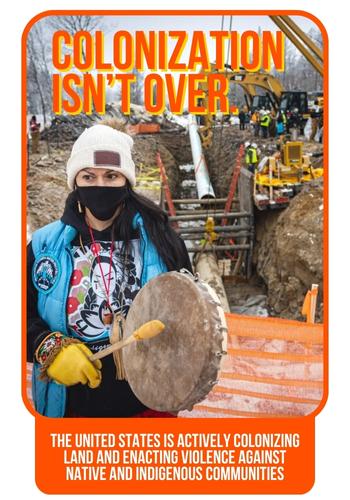Beyond The Land Acknowledgement
How To Do “Thanksgiving” Properly

As Thanksgiving approaches, it’s crucial to reflect on the narratives surrounding this holiday and recognize the importance of being culturally respectful and historically correct in our celebrations. By acknowledging the historical context and the perspectives of Indigenous peoples, we can foster a more inclusive and respectful atmosphere during this season.
What We Say Matters
Here at Howard Brown Health, we do our level best to use accessible, respectful, and culturally sensitive language. How we talk about something matters, and Thanksgiving and Indigenous Peoples’ Day are no different. Different people prefer to use differing language to identify themselves; some may use Indigenous People, First Nations, or their tribe title. For the sake of continuity, we will use “Indigenous People” in this blog, but we recognize and hold space for all preferred titles and terms.

In addition to that, we want to put this at the top of the blog to ensure it gets read: using terms like “my tribe” and “spirit animal” are never acceptable unless you are an actual indigenous person or someone whose spirituality involves totems, spirit guides, and sacred animals. Your lazy pet cat is not your “spirit animal.” You just relate to them. Your friend who volunteered to help you move apartments is not part of your “tribe.” They’re just a good friend.
Every time you use these terms incorrectly, you appropriate Indigenous Peoples’ cultures, you trivialize a sacred spirituality practice, and you diminish the importance of entire communities and tribes. It doesn’t matter that an Indigenous Person isn’t present. Do not say it. When it comes to changing your language habits, mistakes happen as always – apologize, do better, and move on.
Honoring Indigenous Peoples’ Day
Before delving into Thanksgiving, let’s first consider the significance of Indigenous Peoples’ Day. Now, this is observed every year in October, but it is important every day of the year. It also frames our mindset for Thanksgiving and the narratives that surround it, particularly with November being Native American Heritage Month. The observance of Indigenous Peoples’ Day offers an opportunity to rectify historical inaccuracies and challenge the glorification of figures like Columbus, whose legacy is one of violence and colonialism. We honor descendants who have survived hundreds of years of genocide, erasure, silencing, and forced assimilation and relocation. We cannot begin to repair the harms done to the Indigenous peoples of our lands without naming the truths of our past. We cannot know the depth of work needed to create a future where Indigenous peoples are treated with dignity and respect and receive the justice and reparations they deserve. We should note that colonization is not over – the United States is actively colonizing this land and enacting violence against Native and Indigenous communities. Recognizing the resilience of Indigenous communities, who have endured centuries of genocide, erasure, and forced assimilation, is a crucial step towards understanding the depth of the work needed to create a more just future.
Thanksgiving: Beyond the Myth
While Thanksgiving has traditionally been celebrated as a harvest festival, it’s essential to acknowledge the violent legacy of colonization that often gets overlooked in the myth of peaceful coexistence. The Dakota War of 1862 – where dozens of Dakota tribal members were executed by our federal government — serves just one of many poignant reminders of the atrocities committed during this period. Yet today, the federal government pardons a turkey instead of apologizing for its legacy of horror towards Indigenous people. By confronting the uncomfortable truths of our past, we pave the way for a more nuanced and respectful understanding of history.
November: Native American Heritage Month
In recent years, there has been a growing recognition of November as Native American Heritage Month. This designation allows us to shift the focus towards honoring Indigenous rights and acknowledging the real history of Indigenous peoples in the United States. As part of our efforts to honor Indigenous rights and the real history of Indigenous peoples in the U.S., Howard Brown Health acknowledges that our clinics and offices were built on the homelands of the Ojibwe (Chippewa), Bodwéwadmi (Potawatomi), and Odawa nations, as well as the Kiikaapoi (Kickapoo), Peoria, Kaskaskia, Myaamia (Miami), Očhéthi Šakówiŋ (Sioux), and Hoocąk (Ho-Chunk) nations, before their forced assimilation, labor, and removal from their ancestral lands.

Howard Brown Health’s acknowledgment of the lands on which their clinics and offices stand demonstrates a commitment to transparency about the historical context of their locations on stolen land. We know that even this falls short. Acknowledging a crime is only the first step; unless we are committed to returning these lands to who they belong to, we must do more than simple land acknowledgements.
Learning and Supporting Indigenous Communities
Non-natives play a crucial role in fostering a more inclusive environment. Understanding the history of the lands we inhabit is a small yet impactful step towards acknowledging the complexities of our shared history. Amplifying Indigenous voices, histories, and causes is another way non-natives can contribute to a more equitable society.
Supporting Indigenous women and Two-Spirit leaders is essential in addressing issues such as climate justice, gender-based violence, and the alarming rates of Missing and Murdered Indigenous Women. Additionally, recognizing that colonization is an ongoing issue is crucial; Indigenous communities continue to face violence and challenges in their fight for justice and the reclamation of their lands.
For a culturally conscious Thanksgiving, let us approach the holiday with sensitivity and a commitment to understanding the diverse perspectives that shape our nation’s history. By acknowledging the truths of our past and actively supporting Indigenous communities, we can contribute to a more just and inclusive future for all. Thanksgiving can then become an opportunity for reflection, education, and meaningful dialogue, fostering connections that transcends the confines of tradition.